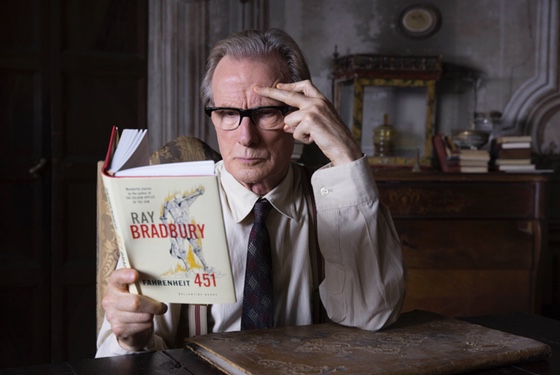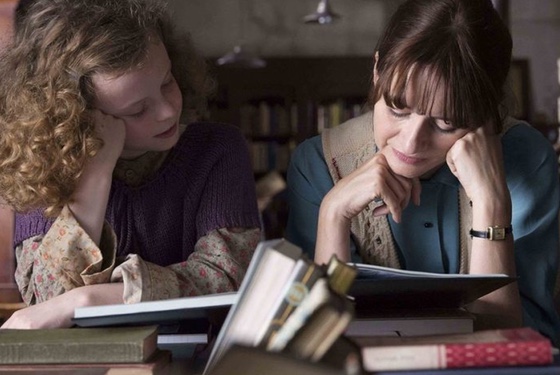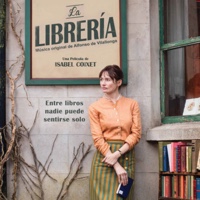Bookishness is not a quality that translates well to the screen. The quiet comfort of solitude, and the strength that introverts gain from being alone. The joy of curling up with a good book and getting lost in another world. The elusiveness, the peculiarly internal stillness and withdrawal from the world — and from oneself — that delving into another human being’s thoughts and psyche brings. Is there anything less cinematic? And yet Spanish writer-director Isabel Coixet manages to capture a hint of that with The Bookshop, in how she eschews the easy comfort that we might expect from a story that is, on its surface, pure twee historical-costume-drama escapism.
In the 1950s, war widow Florence Green (Emily Mortimer: The Party, Ten Thousand Saints) relocates from London to a conservative seaside English town with plans to open a bookshop. She faces opposition from local queen bee Violet Gamart (Patricia Clarkson: The Party, Maze Runner: The Death Cure), who cannot abide competition for the title of Most Cultured. She is welcomed by book-loving recluse Edmund Brundish (Bill Nighy: Their Finest, The Limehouse Golem), who becomes her first customer. She finds an ally in pragmatic youngster Christine (Honor Kneafsey: Miss You Already), whose job as shop assistant may be expanding her heretofore limited horizons. Etc, etc. There’s not much unexpected to be found in a bare description of the plot.

But the treasure who is Emily Mortimer strides through the unspooling of that plot with the sort of grace that comes from self-possession — Florence is a determined woman, and has no time for petty nonsense that wants to thwart her — and yet also with the sort of awkwardness that comes from being someone who prefers the company of books over that of people. (Disclaimer: Not all readers are like this! Even Florence isn’t, all the time. But book lovers: You will feel seen by this movie.) The scene in which Florence first encounters Violet, at a soiree at the wealthy woman’s home, is beautifully shot by Coixet: cinematographer Jean-Claude Larrieu uses handheld cameras to create a slightly jarring ambiance to highlight Florence’s discomfort in this posh and suave crowd, and in her own self-conscious dressing-up to fit in. (The embarrassment with which she had previously declared her new party dress to be “too red,” too likely to draw attention to herself, comes flooding back here, too.)
Of course there are moments of cosiness: this is a movie about the love of books to the exclusion of almost all else, and Coixet lingers with nerdy delight on piles of books and shelves of books and books beautifully arrayed in the shop window… and on Florence, reading. Florence’s establishment is very much a place that some of us would happily wander for hours browsing. But the off-kilter way in which Coixet depicts Florence’s interactions with other people — with lots of long uncomfortable pauses — brands her as an outsider not just physically but in spirit. It’s oddly appealing… perhaps in that same way that book lovers cherish their eccentricity. The love of books here is not a universal one — when has it ever been? — but a secret shared among the chosen few. Which hardly seems like a good basis for a business venture, but that’s a mystery of book culture, too.

The Bookshop — based on the novel by Penelope Fitzgerald (which I have not read) — isn’t entirely successful as a story. There’s a surprising lack of conflict, which is a terrible problem: Mrs. Gamart’s battle against the bookshop doesn’t really ramp up until the final third of the film (though Clarkson brings her usual delicious bite); the enigma of Mr. Brundish rather fizzles (though Nighy, more restrained than he typically is, has a gentle charm). The film is weighed down by unnecessary narration by someone who isn’t identified until the very end of the story, and who, it turns out, we didn’t really need to be hearing from in this way. The bewildering mystery of those of small minds who can’t handle the likes of Vladimir Nabokov and Ray Bradbury — with whose works Florence scandalizes the town — could use more pointed exploration, particularly when smallmindedness is a disease that continues to inflict our culture today. But as mood piece and a character study of a rarity onscreen — an earnestly cerebral woman — there are pleasures aplenty here.
The Bookshop is the Alliance of Women Film Journalists’ Movie of the Week for August 24th. Read the comments from AWFJ members — including me — on why the film deserves this honor.
























I’m guessing that Vladimir Nabokov wasn’t too popular with those small minds either.
Disliking Nabokov isn’t necessarily the sign of a small mind:
https://lithub.com/men-explain-lolita-to-me/
(Granted, Rebecca Solnit’s reasons probably aren’t the same as the townspeople’s.)
Of course not! But you have to actually READ an author in order to have an informed opinion about his works. :-)
Isn’t that what I said?
Kinda. You did misspell Vladimir’s last name.
That was a *very* roundabout way to point out a typo, Tonio.
My bad. I would have thought that the difference in the way I spelled his name and the way MaryAnn spelled his name would have been obvious but apparently you and MaryAnn had other things on your minds.
And that changes the meaning of what I wrote?
(Fixed my typo.)
No.